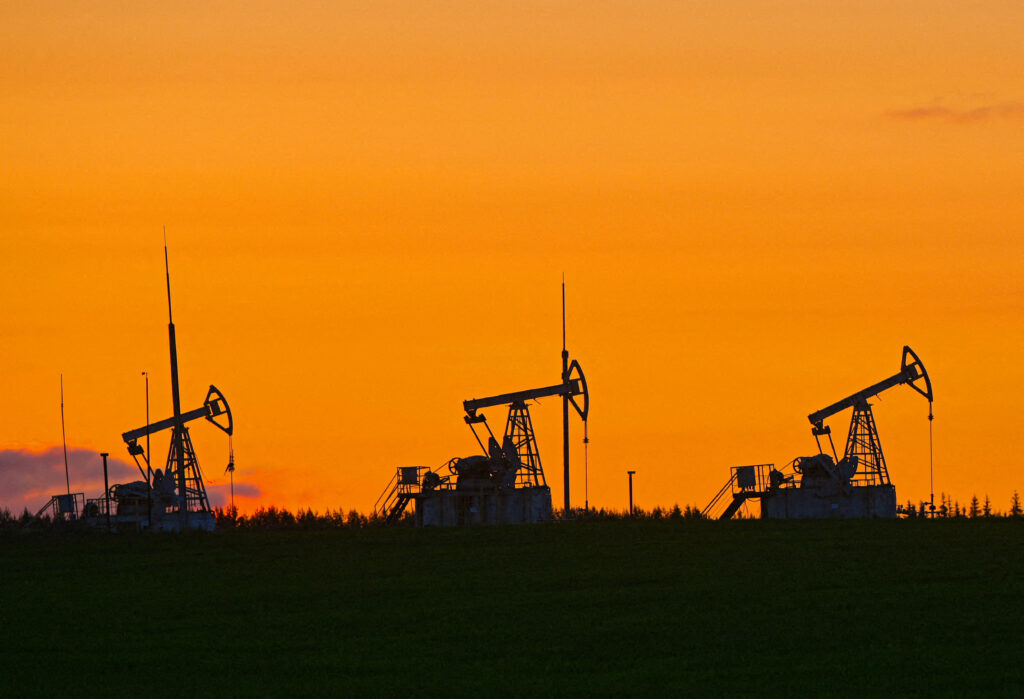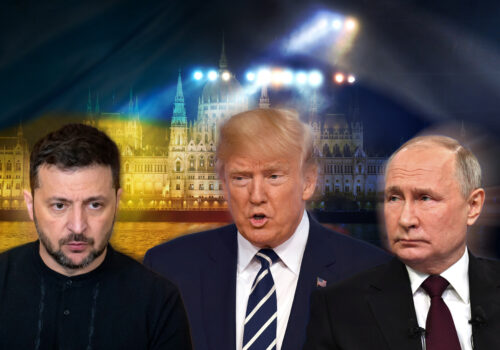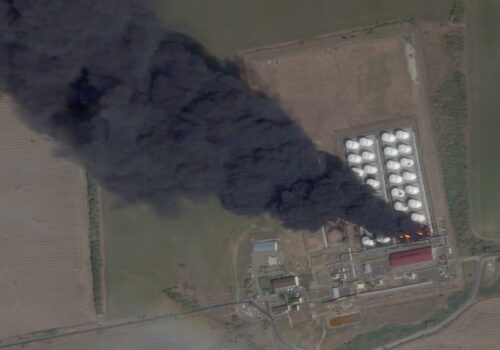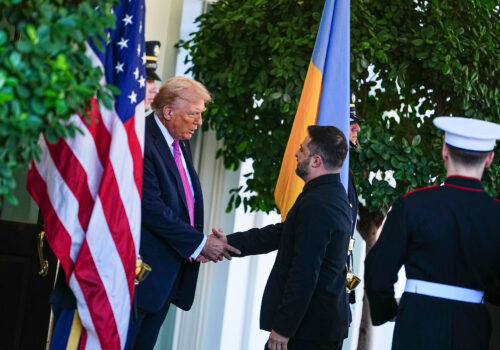JUST IN
“It was time,” President Donald Trump said on Wednesday as he announced that the United States was ratcheting up sanctions on Russia. The new measures—the first such action against Russia in Trump’s second term—target Russian energy giants Rosneft and Lukoil, as well as more than thirty subsidiaries. The sanctions come as US-led efforts to end Russia’s war in Ukraine have stalled, with a proposed meeting between Russian President Vladimir Putin and Trump in Budapest now cancelled. How much of a punch do the new sanctions pack? How might Moscow respond? Atlantic Council experts answer below.
- Daniel Fried (@AmbDanFried): Weiser Family distinguished fellow and former US assistant secretary of state for Europe
- John E. Herbst (@JohnEdHerbst): Senior director of the Eurasia Center and former US ambassador to Ukraine
- Kimberly Donovan: (@KDonovan_AC): Director of the Economic Statecraft Initiative within the GeoEconomics Center and former White House and Treasury official
Why now?
- “This is the first time the Trump administration has imposed any new financial restrictions on Russia,” in this term, Dan tells us. This action came “after Putin stonewalled on a cease-fire and patronized Trump” during a call between the two leaders last week.
- “Today’s move is a welcome warning shot to Putin to knock off the games and maximalism and get serious about ending the war,” says Dan.
- And yet, John warns, “Putin still thinks that he can outlast any Western leader in pursuing his war of conquest.”
Sign up to receive rapid insight in your inbox from Atlantic Council experts on global events as they unfold.
What’s the impact?
- Kim predicts a “direct and immediate impact on Russia’s oil profits,” both from legal sales and those via the Kremlin’s price cap-busting shadow fleet.
- The primary sanctions against Rosneft and Lukoil, Kim notes, were pursuant to Executive Order 14024, which she says is significant because it “carries the threat of secondary sanctions on foreign financial institutions that continue to do business with the sanctioned companies.”
- But these sanctions are “not a maximal blow,” says Dan. Tougher US actions, he adds, could include “joining Europe in lowering the price cap on Russian oil, enforcing the oil price cap by putting sanctions on the Russian shadow fleet of tankers,” and sanctioning ports that service them.
- Nevertheless, Dan says the sanctions are “a strong move.” He explains that they could “put even more downward pressure on Russian oil revenues” by forcing Moscow to further discount its oil and “forcing purchasers to consider alternative sources of oil.”
What’s next?
- Kim notes that the US Treasury Department also issued a general license on Wednesday that will “allow for a wind down of transactions with Rosneft and Lukoil, which expires on November 21.” This window, she says should give countries that purchase large amounts of Russian oil, such as China and India, “time to decide if they will stop importing Russian oil or face the threat of secondary sanctions by the United States.”
- Going forward, says Kim, the United States should continue aligning sanctions policy with the United Kingdom and the European Union. (Though the latter has not yet sanctioned Lukoil.) Such alignment and “consistent enforcement,” she writes, “will ensure these actions achieve the desired result and get Putin to negotiate an end to this bloody war.”
- To achieve his goal of ending the war, Trump should “prepare for a monthslong ratcheting up of pressure on Moscow,” says John. “At the moment, all Putin sees for sure is another round of sanctions. It must not be the last round.”
- The United States, “also needs to do more on the military side,” John argues. Even if the Trump administration does not want to give Tomahawk missiles to Ukraine now, John asks: “Why repeat the Biden tactic of ruling out measures that make the Kremlin nervous?”
- “Trump can only achieve a durable peace,” says John, “if he persuades Putin that the United States and its allies will arm Ukraine to the point that further Russian military gains are not possible.”
Further reading
Tue, Oct 21, 2025
Budapest summit postponed as Putin rejects Trump’s ceasefire proposal
UkraineAlert By Peter Dickinson
Just days after US President Donald Trump announced plans for a new summit with Russian counterpart Vladimir Putin, their proposed Budapest meeting has been thrown into doubt by Russia's rejection of a ceasefire in Ukraine, writes Peter Dickinson.
Tue, Oct 21, 2025
Vladimir Putin’s war machine may finally be running out of fuel
UkraineAlert By
Ukraine’s deep strikes on Russia's energy industry have exposed Putin’s Achilles heel and helped demonstrate that the Russian economy is far more fragile than many in Moscow would like us to believe, writes Vladyslav Davydov .
Mon, Oct 20, 2025
How Trump can apply his Middle East success to ending Russia’s war in Ukraine
New Atlanticist By John E. Herbst
Several lessons learned from the recent US-brokered cease-fire deal between Israel and Hamas can be applied to ending Russia’s assault on Ukraine.
Image: A view shows oil pump jacks outside Almetyevsk in the Republic of Tatarstan, Russia June 4, 2023. REUTERS/Alexander Manzyuk/File Photo




